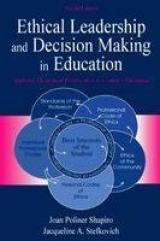
Ethical Leadership and Decision Making in Education
Applying Theoretical Perspectives to Complex Dilemmas, Third Edition
Seiten
2000
Lawrence Erlbaum Associates Inc (Verlag)
978-0-8058-3250-1 (ISBN)
Lawrence Erlbaum Associates Inc (Verlag)
978-0-8058-3250-1 (ISBN)
- Titel erscheint in neuer Auflage
- Artikel merken
Zu diesem Artikel existiert eine Nachauflage
This guide was created in response to growing interest in ethics, and courses on it in educational leadership programmes. The authors discuss the relevance of self-reflection on the part of both instructors and students, and model how they thought through their own personal and professional ethics.
The authors developed this textbook in response to an increasing interest in ethics, and a growing number of courses on this topic that are now being offered in educational leadership programs. It is designed to fill a gap in instructional materials for teaching the ethics component of the knowledge base that has been established for the profession. The text has several purposes: First, it demonstrates the application of different ethical paradigms (the ethics of justice, care, critique, and the profession) through discussion and analysis of real-life moral dilemmas that educational leaders face in their schools and communities. Second, it addresses some of the practical, pedagogical, and curricular issues related to the teaching of ethics for educational leaders. Third, it emphasizes the importance of ethics instruction from a variety of theoretical approaches. Finally, it provides a process that instructors might follow to develop their own ethics unit or course.
* Part I provides an overview of why ethics is so important, especially for today's educational leaders, and describes a multiparadigm approach essential to practitioners as they grapple with ethical dilemmas.
* Part II deals with the dilemmas themselves. Ethical dilemmas written by the authors' graduate students bring readers face-to-face with the kinds of dilemmas faced by practicing administrators in urban, suburban, and rural settings in an era full of complexities and contradictions.
* Part III focuses on pedagogy and provides teaching notes for the instructor. The authors discuss the importance of self-reflection on the part of both instructors and students, and model how they thought through their own personal and professional ethical codes as well as reflected upon the critical incidents in their lives that shaped their teaching and frequently determined what they privileged in class.
The authors developed this textbook in response to an increasing interest in ethics, and a growing number of courses on this topic that are now being offered in educational leadership programs. It is designed to fill a gap in instructional materials for teaching the ethics component of the knowledge base that has been established for the profession. The text has several purposes: First, it demonstrates the application of different ethical paradigms (the ethics of justice, care, critique, and the profession) through discussion and analysis of real-life moral dilemmas that educational leaders face in their schools and communities. Second, it addresses some of the practical, pedagogical, and curricular issues related to the teaching of ethics for educational leaders. Third, it emphasizes the importance of ethics instruction from a variety of theoretical approaches. Finally, it provides a process that instructors might follow to develop their own ethics unit or course.
* Part I provides an overview of why ethics is so important, especially for today's educational leaders, and describes a multiparadigm approach essential to practitioners as they grapple with ethical dilemmas.
* Part II deals with the dilemmas themselves. Ethical dilemmas written by the authors' graduate students bring readers face-to-face with the kinds of dilemmas faced by practicing administrators in urban, suburban, and rural settings in an era full of complexities and contradictions.
* Part III focuses on pedagogy and provides teaching notes for the instructor. The authors discuss the importance of self-reflection on the part of both instructors and students, and model how they thought through their own personal and professional ethical codes as well as reflected upon the critical incidents in their lives that shaped their teaching and frequently determined what they privileged in class.
Contents: Preface. Part I: Practice and Paradigms in the Study of Ethics. Multiple Ethical Paradigms and the Preparation of Educational Leaders in a Diverse and Complex Era. Viewing Ethical Dilemmas Through Multiple Paradigms. Part II: A Multiparadigm Approach to Analyzing Paradoxical Dilemmas. Individual Rights Versus Community Standards. Traditional Curriculum Versus Hidden Curriculum. Personal Codes Versus Professional Codes. The American Melting Pot Versus The Chinese Hot Pot. Equality Versus Equity. Part III: Teaching as Scholarly Work. Ethics, Ourselves, and Our Pedagogy.
| Erscheint lt. Verlag | 10.7.2007 |
|---|---|
| Zusatzinfo | references, diagrams |
| Verlagsort | Mahwah |
| Sprache | englisch |
| Themenwelt | Geisteswissenschaften ► Philosophie ► Ethik |
| Sozialwissenschaften ► Pädagogik ► Allgemeines / Lexika | |
| Sozialwissenschaften ► Pädagogik ► Bildungstheorie | |
| ISBN-10 | 0-8058-3250-5 / 0805832505 |
| ISBN-13 | 978-0-8058-3250-1 / 9780805832501 |
| Zustand | Neuware |
| Haben Sie eine Frage zum Produkt? |
Mehr entdecken
aus dem Bereich
aus dem Bereich



